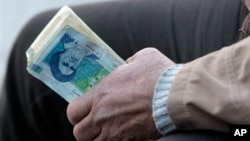The United States remains committed to preventing Iran from obtaining a nuclear weapon, said U.S. Under Secretary of State for Political Affairs Wendy Sherman at an October 3 hearing before the U.S. Senate Foreign Relations Committee on “Reversing Iran’s Nuclear Program.”
Under Secretary Sherman assured committee members that the U.S. “will continue to vigorously enforce the sanctions that are in place as we explore a negotiated resolution, and will be especially focused on sanctions evasion and efforts by the Iranians to relieve the pressure.”
Acknowledging the “deep mistrust” between the United States and Iran, Under Secretary Sherman said, “Any productive path forward must start with mutual confidence building through meaningful, transparent and verifiable steps.”
"Any productive path forward must start with mutual confidence building through meaningful, transparent and verifiable steps."
“We will be looking for specific steps by Iran that address core issues, including but not limited to the pace and scope of its enrichment program, the transparency of its overall nuclear program and stockpiles of enriched uranium. The Iranians, in return, will doubtless be seeking some relief from the comprehensive international sanctions that are now in place.”
According to Under Secretary Sherman, the current sanctions regime applied to Iran is one of the toughest the world has ever seen. “As a result,” she said, “23 economies have united in significantly reducing or eliminating purchases of Iranian crude oil.”
Over the past 24 months Iran’s currency, the rial, has depreciated by about 60 percent as Iran’s access to the international financial sector has been largely severed, she said. The devastating effect of the sanctions on the Iranian economy, Under Secretary Sherman said, was recognized by Hassan Rouhani in the run-up to his election as Iran’s president in June.
“We seek an agreement,” she said, “that respects the right of the Iranian people to access peaceful nuclear energy while ensuring to the world that Iran meets its responsibilities under the Nuclear Non-Proliferation Treaty and U.N. Security Council resolutions.”
Under Secretary Sherman assured committee members that the U.S. “will continue to vigorously enforce the sanctions that are in place as we explore a negotiated resolution, and will be especially focused on sanctions evasion and efforts by the Iranians to relieve the pressure.”
Acknowledging the “deep mistrust” between the United States and Iran, Under Secretary Sherman said, “Any productive path forward must start with mutual confidence building through meaningful, transparent and verifiable steps.”
"Any productive path forward must start with mutual confidence building through meaningful, transparent and verifiable steps."
“We will be looking for specific steps by Iran that address core issues, including but not limited to the pace and scope of its enrichment program, the transparency of its overall nuclear program and stockpiles of enriched uranium. The Iranians, in return, will doubtless be seeking some relief from the comprehensive international sanctions that are now in place.”
According to Under Secretary Sherman, the current sanctions regime applied to Iran is one of the toughest the world has ever seen. “As a result,” she said, “23 economies have united in significantly reducing or eliminating purchases of Iranian crude oil.”
Over the past 24 months Iran’s currency, the rial, has depreciated by about 60 percent as Iran’s access to the international financial sector has been largely severed, she said. The devastating effect of the sanctions on the Iranian economy, Under Secretary Sherman said, was recognized by Hassan Rouhani in the run-up to his election as Iran’s president in June.
“We seek an agreement,” she said, “that respects the right of the Iranian people to access peaceful nuclear energy while ensuring to the world that Iran meets its responsibilities under the Nuclear Non-Proliferation Treaty and U.N. Security Council resolutions.”






